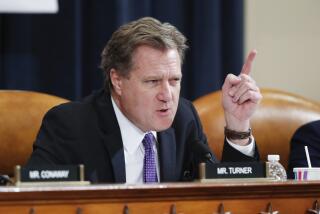Senators Warn Soviets About Pact Violations
- Share via
GENEVA — A delegation of U.S. senators, here to observe the opening of the new round of nuclear arms control talks, issued a unanimous warning Tuesday that no new agreement with the Soviet Union can be ratified unless the issue of violations of past agreements is clarified.
“The Soviet Union must understand that if it genuinely wants these talks to produce an agreement, it must be far more forthcoming in responding to U.S. demarches on the violations issue and in halting prohibited strategic activities,” the bipartisan delegation declared in a joint statement.
Sen. Ted Stevens (R-Alaska) added: “Every senator who has seen and studied the satellite photos of the radar complex the Soviet Union is constructing near Krasnoyarsk is convinced that this is in violation of the 2972 Anti-Ballistic Missile Treaty. We do not know what its purpose or performance will be when it is turned on.
“The single most important thing that the Soviets could do to advance this negotiation would be to dismantle that radar installation.”
The United States has already asked the Soviets to clarify the purpose of the Krasnoyarsk installation through the machinery of the U.S.-Soviet Standing Consultative Commission, set up under the 1972 treaty. Thee request will also be pushed by the head of the U.S. delegation at the current talks, Max M. Kampelman.
U.S. analysts say that the Siberian radar station--detected in July, 1983, by an American spy satellite--will be capable of directing interceptor missiles toward incoming warheads, of assessing hits and otherwise running the missile defense for much of the Soviet Far East. That would be a violation of the treating limiting anti-missile defenses.
Ten senators, lead by Majority Leader Bob Dole (R-Kan.) and Minority Leader Robert C. Byrd (D-W.Va.), flew to Geneva on Saturday to attend U.S. delegation briefings and preparatory discussions for the opening of the talks Tuesday. The senators will return to Washington today.
More to Read
Sign up for Essential California
The most important California stories and recommendations in your inbox every morning.
You may occasionally receive promotional content from the Los Angeles Times.










